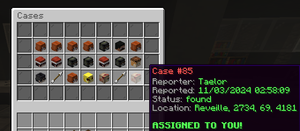As a Detective, your job is to investigate crimes, primarily murders, and solve cases using clues left behind at crime scenes. Unlike Police Officers, Detectives don’t arrest criminals or jail them, but instead, focus on gathering evidence, processing clues, and solving cases. Detectives work closely with Police Officers by providing the necessary information for them to issue arrests and track down criminals.
Reporting a Murder
When a player dies in the game, it’s possible for a murder case to be created. Murder cases are reported by:
- Victims using
/911or - Random passersby who see a clue and click on it to report the murder.
This will create an open case for Detectives to work on. Detectives can view all open cases by using the /cases command.

You can click on a case to assign it to yourself. However, you must solve the case within 6 hours, or it will become unassigned.
- Assigned cases go to the last page of the crime menu!
You won’t be able to assign yourself to the same case again, but another Detective can take over. Additionally, if a case remains unsolved for 24 hours, it becomes cold and can no longer be solved.


Collecting Clues
At the crime scene, 1-3 clues (e.g., blood splatter or projectile casings) will be left behind, depending on the murder method. Detectives have 60 seconds to find as many clues as they can once they arrive at the crime scene. The killer may attempt to move the clues within 4 blocks of the body, but if you're quick, you’ll be able to find them all.
- Blood splatter is often left behind when a melee weapon is used.
- Projectile casings are left when a ranged weapon is used.

Using the Analyser
After collecting clues, a Detective must bring them to an Analyser located at a Police Station. The Analyser processes each clue and reveals important information such as:
- Who started the fight
- The victim
- The attacker
- Location
- Time of death
These revealed clues provide all the details necessary to piece together the full story of the crime. Without using the Analyser, clues won’t reveal any information, so it’s crucial to process them properly. Detectives must wait 30 seconds between uses of the Analyser. Only Detectives can use this tool.

Solving the Case
Once all clues have been processed, Detectives should return to the Evidence Locker by right-clicking the case in the /cases menu. Move all revealed clues into the locker and click submit to solve the case.

If the person who started the fight doesn’t match the victim, a wanted point will be generated for the attacker. Police Officers can then issue an arrest.
If a Detective fails to gather all clues in time, the case will go cold and can no longer be solved. If you're struggling to find enough clues, enlist the help of another Detective before the timer runs out.
TIP: You can assess the scene before picking up clues.
Cold Cases
If a case isn’t solved within 24 hours, it becomes a cold case. Cold cases are moved to a special section in the /cases menu, and Detectives cannot solve them. The clues associated with cold cases become invalid, so it’s essential to act quickly.
Tools and Responsibilities
Detectives use specific tools that help them investigate and solve cases:
- Analysers: Reveal detailed information from clues.
- Evidence Locker: Used to submit processed clues and solve cases.
Unlike Police Officers, Detectives do not:
- Chase down criminals or
- Arrest and jail criminals.
Those tasks are handled by Police Officers, who can handcuff, tase, and jail criminals based on the information provided by Detectives. After solving a case, Detectives should notify all available Police Officers to issue an arrest if applicable.
Police Officer vs. Detective
It’s essential to understand the difference between Detectives and Police Officers:
- Police Officers chase down, arrest, and jail criminals. They have tools like handcuffs, tasers, pepper spray, and batons to manage crime.
- Detectives investigate crimes, collect and process clues, and solve cases. They do not make arrests or chase criminals.
Only Police Officers can jail criminals. Once a case is solved, Detectives must coordinate with Police Officers to ensure arrests are made.
Frequently Asked Questions
- How do I report a murder?
- Use
/911if you're the victim or click on a clue if you’re a passerby.
- Use
- What happens if I don’t solve a case within 6 hours?
- The case becomes unassigned, and another Detective can take it. You won’t be able to reassign yourself to the same case again.
- What happens if I don’t solve a case within 24 hours?
- The case becomes cold, and the clues disappear, making it impossible to solve.
- What does an Analyser do?
- It reveals important information from clues, such as who started the fight, the victim, the attacker, and more.
- What should I do after collecting and processing all clues?
- Submit the clues in the Evidence Locker via the
/casesmenu to solve the case.
- Submit the clues in the Evidence Locker via the
- What should I do if I’m struggling to find enough clues?
- Enlist the help of another Detective before the 6-hour time limit runs out.
By following this guide and understanding the responsibilities of a Detective, you’ll be well-prepared to pass the exam and serve your community by solving crimes!
This guide now includes the requested updates about revealed clues, time limits, cold cases, and the distinct roles of Detectives and Police Officers.
